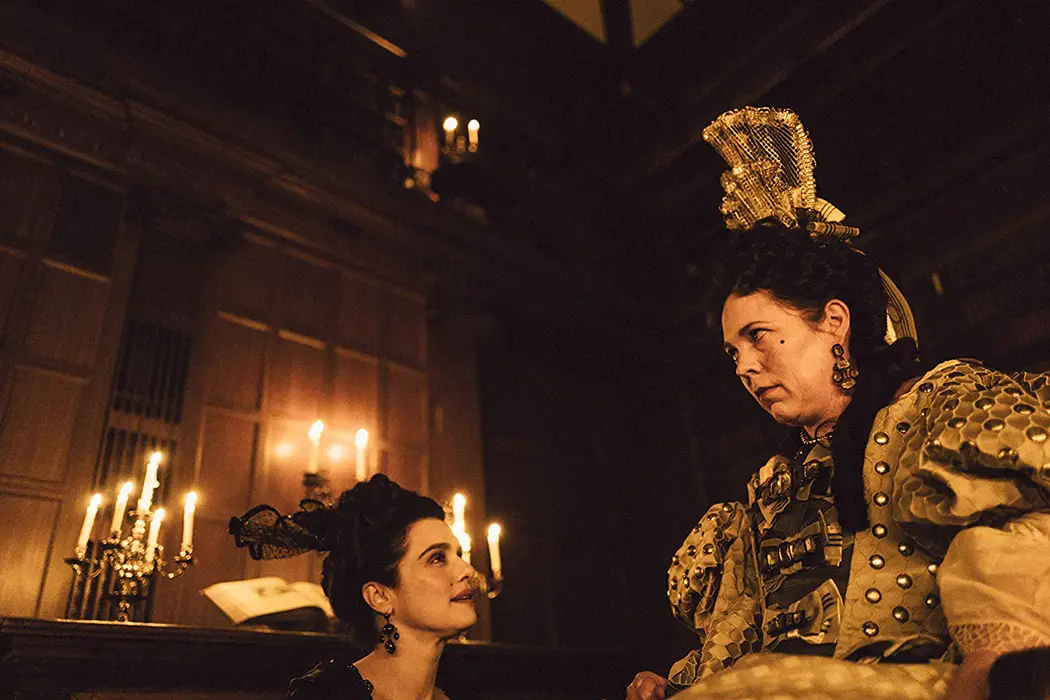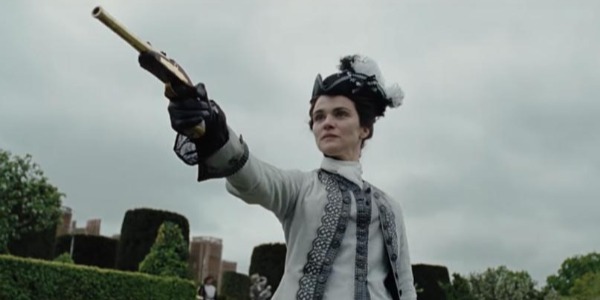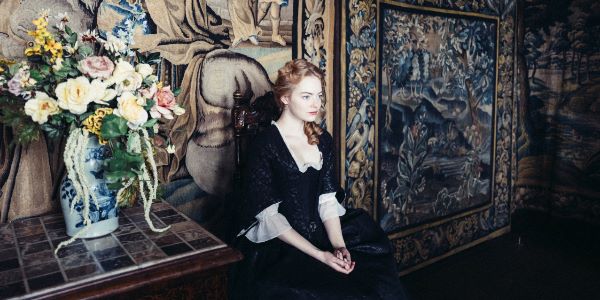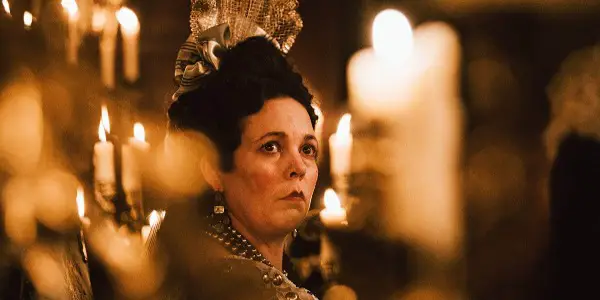The Folly Of Power In THE FAVOURITE

Alex is a film addict, TV aficionado, and book lover.…
Ever since Yorgos Lanthimos burst onto the international stage with Dogtooth, his reputation as an idiosyncratic, heavily stylized director has become overwhelming. A true auteur in our auteur-centric time, much of the conversation around his films have focused on his trademarks, from stilted dialogue to the precise way he frames his characters.
This is, on the one hand, an innocuous way to discuss tone. He’s consistently playful about the way he sees broken worlds, but his humor is often harsh and shocking. Some find this approach enlivening while others consider it stiff, and while discussing the myriad of reactions people have to his films is a fruitful exercise on its own, leaving it at that is hardly a true evaluation of his work.
Unfortunately (at least to me), we live in the age of auteur criticism, a decades-long building on Andrew Sarris’ argument that a film with a readily identifiable author denotes value (a quick guide to auteur theory can be read here). Too often we break down and evaluate the consistent traits of the author (most often a director) and leave little time for the particulars of an individual film. After all, if we follow Sarris, as much critical talk does, simply identifying an auteur is an evaluation of quality. That can leave the strengths, weaknesses, and overarching themes of an individual work underexplored, and when you start applying this line of evaluation to an auteur with as dense and uncompromising trademarks as Lanthimos, there’s little time for particulars.
It’s frustrating, then, when someone like Lanthimos delivers top tier work like The Favourite. While we discuss how it fits in with Lanthimos’ previous films, what it’s done to upend familiar staples of a costume drama, and hoot about all the times women finger each other, we barely scratching the surface of the tragic and horrifying messages that Lanthimos’ style makes palatable (at least to many people). With the depth of its story in danger of being overwhelmed by more general applause for a great Lanthimos film, let’s break down at least one of the specific things this film does masterfully: using its characters to show the myriad of ways people doom themselves by chasing power.
Lady Sarah’s Fall From Grace
Sarah Churchill, Duchess of Marlborough (Rachel Weisz) starts out The Favourite with the heart and mind of the Queen of England firmly in her control, which for the early 1700s, makes her one of the most powerful people in the world. War with France and a pesky opposition party keeps her busy, much to her delight. She strides through court with self-assurance, barking orders and coarsely speaking her mind with little chance of reprisal. Her downfall is easy to track because she’s so willing to state it herself: she was late to the power struggle, largely because she didn’t imagine needing to fight at all.
Her power comes entirely from the favor of Queen Anne (Olivia Colman), and their relationship is a decades-spanning friendship and love affair. Even without knowing that the Queen came to power through an unlikely string of events (which isn’t mentioned in the film), the idea of Sarah seeking her out solely for power is made rather ludicrous when you examine how she treats Anne. Sarah’s mix of patient care and brutal honesty makes clear that she is, in her own way, lovingly stopping Anne from falling prey to her demons and guiding her towards what she thinks is best for the country.

Problem is that she’s not striking the right balance between cruelty and compassion in any of her duties, with a close political confidante admonishing her for running roughshod over opposition party leadership and Anne quickly letting her eye wander to the pretty yes (wo)man, Abigail (Emma Stone). Sarah’s long years in power gave her a false sense of security, and once she notices it slipping, she proves entirely unable to play from behind.
Blunt tactics blow up in her face, and only when Anne shows that her power can be removed does Sarah deign to show her vulnerability. This proves to be too little, too late, and Sarah is eventually banished from England. But in an important twist, being removed from power is the happiest ending that any of the three leads in The Favourite get. Yes, she must suffer the loss of a love, but her future is still full of possibilities outside England.
Abigail’s False Hope
Now’s when things get really dark, because Abigail comes onto the scene with more baggage than anyone should have to carry. While she may seem like a straightforward scheming usurper, the film constantly reminds us that her ascent to Anne’s side is motivated by one of the most basic needs: autonomy of her body.
Having fallen from nobility and been traded by her father to settle gambling debts, she is more keenly aware of being vulnerable than either her mark or her adversary. The constancy of her being physically used and abused hits us early: a man jerks off while they are in a carriage, she is knocked out of said carriage when the man pinches her, and she is tricked into burning her hand with lye. The exposure she feels is written across her face as she tries to sleep in a room full of strangers, so her initial wheedling into Sarah’s good side may seem like an innocuous survival instinct. The desperation of her actions become clear quickly, though, and the cold way she goes about her work takes on a depressing air.

Think about the transactional way she uses sex. Once she catches on that the Queen and a young nobleman may be interested in her, she immediately begins using her body as a ware, seducing both in games from which she derives no pleasure. A handjob is given absentmindedly, she lays her body prone for the Queen’s pleasure, and her history of rape is trotted out to curry sympathy. Several of these moments are played for laughs, especially at the expense of the film’s irrelevant men, but it’s also saying something very specific about the way Abigail is accustomed to using her body as a tool. A moment of crisis makes clear that, while she doesn’t enjoy these stunts, she feels that she must continue down this path until her place at the Queen’s side, and hence her desired autonomy, is won.
The cruel reality for Abigail is revealed in the last shot of the film, which lays bare just how far all her machinations have brought her. She and Anne are alone in the Queen’s bedchambers, Abigail’s nobility has been restored, and her facade as a sweet, caring companion has been dropped. She feels that she has finally won, but the Queen, upon realizing who Abigail truly is, calls her over to put her in her place. Abigail is commanded to kneel down and rub the Queen’s legs (the code the film uses for sex), and as you hold on Abigail’s falling face, the realization that she is still a plaything for a more powerful person sinks in. Her surroundings have gotten more comfortable but little else has changed from her days with the man her father sold her to, having failed to secure autonomy of her body despite achieving the position of power she worked so hard to get.
Queen Anne’s Self-Destruction
That leaves us with the ultimate figure of power in The Favourite: Queen Anne. She doesn’t start off looking like she’s in control, what with Sarah having essentially taken over operation of the country. She seems to be a puppet, a squirreled away symbol that is trotted out for the occasional announcement, and her pervasive isolation is palpable. The Favourite doubles down on her melancholy, making Anne into such a battered, broken thing that her eventual assertion of power sneaks up on us, and her inexperienced wielding of it causes her own descent into madness.
It’s true that Anne isn’t entirely stable when the film starts. She’s indulgent of her loves (she gives Sarah a freaking palace) and seems more interested in trivial entertainment than the affairs of the country. This is partially Sarah’s doing, as she has cut her off from most others to both maintain control and save the Queen embarrassment, but the few times that Anne is around others shows that she is inept at handling conflict. If left to her own devices, one sincerely wonders whether she would be capable of running the country at all.

Once Abigail comes into the picture, though, she is suddenly given a true choice, and her immature delight at dangling the young ingénue in front of Sarah is almost endearing. What Abigail has done is break Sarah’s firm hold on the Queen, not only in the bedroom, but also in the day to day maintenance of her life. Abigail stocks her room with deserts and begins letting her rabbits gallivant around, indulgences Sarah banned due to the Queen’s troublesome stomach and perpetual grief (the rabbits, remember, represent her 17 dead children). The Queen’s behavior actually becomes more erratic as Abigail ascends, and what becomes clear is that Sarah was the one person who would tell her when her impulses were detrimental.
Anne is a quintessentially tragic figure; a lonely, overwhelmed person hanging so tenuously to her sanity that even small irritants trigger fits of rage or melancholy. The choice presented to her, Abigail or Sarah, is one she is wholly incapable of making, and of course she succumbs to the temptation of Abigail. That she is in a position where her word goes means there’s no one to stop her from choosing a fraud over a broken relationship, and that those are her only two choices make the scenario even more tragic.
Abigail actually gave the Queen more control over her life, and in that final shot, the disastrous way she wields it is revealed. She is not only using sex to exert her power (a monstrous action), but as the camera drifts up to her face, we have an image that contrasts an earlier moment of pain and fear. When she had her first attack of gout, we get a disorienting view of Anne’s state of mind, one where the faces of Anne and Sarah are overlapped. The moment passes, though, as Sarah tends to the Queen. At the film’s end, we have a slight break from reality again, and this time we see Anne and Abigail’s faces overlap. Instead of returning to a state of calm, the rabbits overwhelm the frame, reflecting the way the Queen’s individual, unchecked choices led to grief and madness overwhelming her.
Appreciating The Whole
Billed as the most accessible Lanthimos film to date, The Favourite is being praised for its ribald sense of humor, its array of complicated female characters, and the melancholy that lingers behind the fun. These are all Lanthimos staples, though, and the specific way he’s employing these elements to provide commentary on the illusory, empty nature of power is getting lost in the shuffle. This and many other specifics of the film are what make it great, not the fact that it is a slightly softened version of Lanthimos’ tragicomic vision. Without getting into these sorts of specifics, we’re at risk of selling short a rather brilliant film.
Does content like this matter to you?
Become a Member and support film journalism. Unlock access to all of Film Inquiry`s great articles. Join a community of like-minded readers who are passionate about cinema - get access to our private members Network, give back to independent filmmakers, and more.
Alex is a film addict, TV aficionado, and book lover. He's perfecting his cat dad energy.













